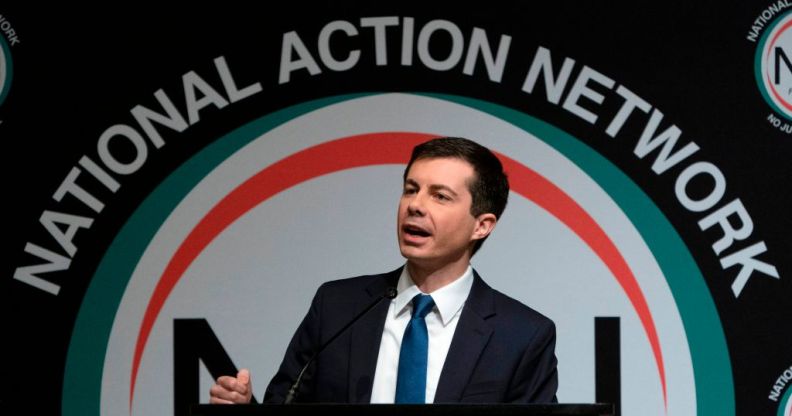Why China’s LGBT community hopes Pete Buttigieg will become US president

Presidential hopeful Pete Buttigieg (DON EMMERT/AFP/Getty)
Pete Buttigieg, who launched his 2020 presidential campaign over the weekend, could become the first openly gay US president, and it seems even people in China are watching his campaign with a keen eye.
The 37-year-old mayor of South Bend, Indiana, announced his run for the White House at a rally on Sunday (14 April), setting out a liberal agenda and pledging to promote a “different story” to President Donald Trump’s divisive ‘Make America Great Again’ catchphrase.
The Democratic hopeful has seen support from across the US, but also among LGBT+ communities worldwide too, including China.
According to a CNN report, LGBT+ leaders and human rights groups in the country have shown an interest in Buttigieg—despite his rise through the political ranks going unreported by China’s state media.
Xiaogang Wei, a leading LGBT rights advocate in China who heads the Beijing Gender Health Education Institute, told CNN: “I know he’s 37 years old, once the youngest mayor in America, an Afghan war veteran and a Harvard graduate.
“Any openly gay world leader is good news in terms of raising LGBT visibility.
“But a gay US President would bring so much global visibility and that would be a very positive development for LGBT communities around the world.”
LGBT+ rights in China
Although homosexuality is not illegal in China, LGBT+ communities in the country have been subjected to censorship and discrimination under the Communist government.

Democratic presidential hopeful South Bend, Indiana mayor Pete Buttigieg speaks to members of the media before appearing at the Commonwealth Club of California on March 28, 2019 in San Francisco, California. (Justin Sullivan/Getty)
This week, the Chinese microblogging website Sina Weibo has reportedly been removing posts and comments with the hashtag #les.
The ban on the term, which is short for lesbian, was discovered by users who use the site’s “super topic” feature, where people can create online communities using a hashtag.
The move is said to be part of a new campaign by China’s National Office Against Pornographic and Illegal Publications.
Earlier this year, scenes referencing Freddie Mercury’s sexuality were removed from Bohemian Rhapsody, ahead of the film’s release in China.
Key moments making Mercury’s bisexuality explicit were cut from the film, including intimate kisses between Rami Malek’s Mercury and other men.
Research has revealed a number of challenges faced by China’s LGBT+ community, including high rates of violence and depression among its transgender population.
A poll released in 2017 found high numbers of transgender, non-binary, and gender-nonconforming people live in poverty and lack access to sufficient medical care.
With this in mind, some Chinese activists hope Buttigieg may help put LGBT+ rights on the radar.
Buttigieg’s presidential campaign
Announcing his presidential campaign, Buttigieg set out a liberal agenda, calling out “violent white nationalism rearing its ugly head” and setting out plans for economic reforms to boost smaller post-industrial cities.
The candidate also paid an emotional tribute to his husband Chasten, to loud cheers from the crowd, “for giving me the strength to do this, and the grounding to be myself as we go.”
Referencing LGBT+ rights, he said: “Take it from Chasten and me, you’re not free if a county clerk gets to tell you who you ought to marry because their idea of their political beliefs.”
He added: “Our marriage exists by the grace of a single vote on the US Supreme Court. Nine women and men sat down in a room and took a vote, and brought me the most important freedom in my life.”

